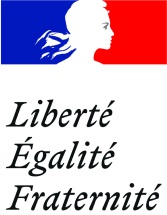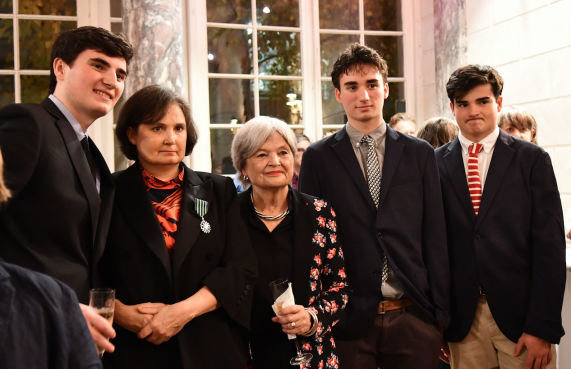On Monday, November 5, Bénédicte de Montlaur, Cultural Counselor of France to the United States, presented Susannah Hunnewell with the insignia of Chevalier in the Order of Arts and Letters during a ceremony at the Cultural Services of the French Embassy in New York City. The Cultural Counselor’s remarks are below.
——————————–
Good evening ladies and gentlemen,
I am Bénédicte de Montlaur, Cultural Counselor of the French Embassy in the United States.
It is my great pleasure tonight to honor Susannah Hunnewell with the insignia of Chevalier des Arts et des Lettres.
The Order of Arts and Letters was established in 1957 by the French government to honor distinguished artists and writers and people who have contributed significantly to furthering the arts in France and throughout the world.
In your case, Susannah, this sounds like a bit of an understatement. According to your cousin, in your Paris years you single-handedly outdid the American embassy in bringing the best of American culture to France. If anything, you should be awarding decorations tonight, but protocol being what it is, allow me to reflect back on your novel-like transatlantic journey.
Throughout your career and in your personal life, you’ve embodied the bridge between France and the United States.
In doing so, your path of choice has always been a literary one, although I wouldn’t restrict your area of expertise to literature. Your way with words isn’t merely scholarly and lettered; it seems to permeate every aspect of your life and character. Your wit, repartee and tongue-in-cheek humor are praised by all, and all ascribe these to your impeccable literary taste.
You have spent half your life in France and half in the United States. Born in Boston, you moved to Paris as an infant, and attended the Ecole Active Bilingue, where your sister Lee now teaches. At age 15, you returned to your ancestral home in Massachusetts, founded by your father’s family. After graduating from the Winsor School in 1984, you stuck around and joined the crimson ranks of Harvard University, where you read English with the playwright William Alfred.
Here opens the first chapter of your Paris Review saga. After college, you entered founder George Plimpton’s literary institution, interning as an editorial assistant. Your intellectual agility and your grace, along with what Plimpton once called a “herculean” work ethic, prompted him to give you varied and important tasks. You copy-edited Niccolo Tucci, translated a wonderful Mario Vargas Llosa interview from original Spanish, and helped George in editing The Paris Review Anthology and The Writer’s Chapbook.
At that time, you also encounter George’s assistant or so-called “aide de camp.” A skilled matchmaker and unlikely fairy godfather, Plimpton sends the two of you on long walks, and smoothly fades away at opportune times. That’s how you meet Antonio Weiss, whom you’ve been married to for 25 years: The very same George Plimpton threw your engagement party in 1993.
You returned to Paris with Antonio and your toddler Nico in 2000 and stay nearly a decade, leaving the right bank for the iconic 5th arrondissement. I heard that when the boys – Nico, Otto and Cosimo — were at the Ecole Alsacienne and you worked as Paris Editor of The Paris Review, you lived in a fantastic house on the rue des Ursulines near the Luxembourg gardens. A fusion of French revolutionary salon, “hotel particulier” and American coolness, it injected the New York spirit into the Parisian 5th arrondissement by way of great garden parties, heated debates and, of course, heaps of books from floor to ceiling.
As the Paris Editor, you conducted widely cited, career-spanning interviews with the expatriate poet and founding Oulipo member Harry Matthews, as well as translators Richard Pevear and Larissa Volokhonsky, and the renowned French novelists Emmanuel Carrère and Michel Houellebecq.
Emmanuel Carrère has very eloquently summed up the brilliance of your work at the Paris Review. I will read an excerpt of his note in French followed by an English translation:
« Les longs entretiens que la Paris Review publie avec des écrivains sont réputés à la fois pour leur sérieux et leur liberté, mais il m’a fallu rencontrer Susannah Hunewell pour mesurer ce que peuvent être ce sérieux et cette liberté. Nous avons passé deux jours ensemble, j’aurais aimé que nous en passions trois, quatre, cinq, tant j’ai pris de plaisir, et je crois elle aussi, à cette conversation. Plus drôle, plus spirituelle, plus amicale que Susannah, je ne connais pas. A la fin, quand elle est partie, j’étais inquiet : qu’allait-elle tirer de cette bonne dizaine d’heures d’entretien ? Quel verbatim trop long ? Quel résumé trop court ? Le résultat, quelques mois plus tard, m’a laissé stupéfait et admiratif : elle avait raccourci, forcément, remodelé, reformulé mes propos, et pourtant j’avais l’impression que tout y était. Dans chaque phrase je reconnaissais ma propre voix. Il faut un talent, non seulement d’écrivain mais de musicienne pour créer une telle transcription, et c’est une expérience rare d’en être l’objet. »
And in English :
The long interviews with writers published in the Paris Review are renowned both for their seriousness and their liberty, but it wasn’t until I met Susannah Hunnewell that I was able to determine what this seriousness and liberty could be. We spent two days together; I would have liked for us to have spent three, four, five, so much I, and I believe she, as well, enjoyed the conversation. I don’t know of anyone funnier, wittier, or friendlier than Susannah. At the end, when she left, I was worried: what would she pull from this good ten hours of interviews? What direct quotes that would be too long? What summary that would be too short? The result, a few months later, left me stunned and admiring: she had made cuts, of course, rephrased my words, but I had the impression that everything was there. In each sentence, I recognized my own voice. One must have talent, not just that of a writer but that of a musician, to create such a transcription and it’s a rare experience to be its recipient.
Your thorough interview of Houellebecq reads as a journalistic tour de force. Anyone would be apprehensive of a two-day closed hearing with France’s most polemic author, but you two amiably bonded over punk rock music. Although last year, he stood you up on this very stage, here at the Cultural Services of the French Embassy, having yet again fallen victim to cough syrup ingestion, this time copiously washed down with champagne and oysters. But don’t you worry; as far as tonight is concerned I’m not going anywhere.
I can only assume the success of this interview has to do with your natural gift for human interaction, your spirit of freedom and spontaneity. You grew up in Paris in the 1970s, and as your close friend, confidant and partner in crime Courtney Smith remembers, it is hard to imagine a more liberated and enchanting environment for precocious children.
In Courtney’s own words, quite like a street performer, you would accost strangers with playful banter, ask trick questions and play practical jokes, to the raucous laughter of your less daring friends. In class you would often burst out with a hilarious non-sequitur but your irresistible charm made you impossible to punish. You were never intimidated; but always confident of your ability to beguile and to delight.
A modern-day Marquise de Merteuil (only with a heart of gold), your cheek and irreverence emerge in your correspondence. Your insightful emails as Publisher of The Paris Review speak clearly about the person you are beneath the hard work and intellectual discipline. Your colleagues would easily have known whom they were from without your signature: they were quintessential Susannah — smart, modest, hilarious.
Here is a particular example, as recollected by Terry McDonell: you’re writing “sitting on my balcony at Chateau Marmont staring at a cypress and a 50 foot billboard, waiting for my eggs benedict. Smoggy heaven on earth.”
Your wit and courage go together with a psychological and intellectual acuity sharpened by the great minds you consistently engage with, intellectually and in your professional life.
You’ve worked along John F. Kennedy Jr. as a Senior Editor at George Magazine, and prior to that as Features Editor for the US launch of Marie Claire under the leadership of the extraordinary Bonnie Fuller. Your short-form interviews for the New York Times Magazine and Book Review introduced you to Norman Rush, Michael Ontaadje, Denis Johnson, William Trevor, and Thom Jones. In Paris, you organized readings at Shakespeare & Co, which included Olivia de Havilland reciting Tennessee Williams, Mavis Gallant excerpting her journals and New York Times writer Alan Riding interpreting Gertrude Stein.
For over three years now, you’ve been the Publisher of The Paris Review, crowning not only 30 years of affiliation, but a career dedicated to bringing the best of Paris to New York, and conversely promoting the best of French culture in the United States.
Your curiosity and love of France extends beyond Paris’ ring road; in this regard you’re more genuinely French than many of us! A keen French slang-enthusiast, you’ve traveled our regions and terroirs with a soft spot for Provence, the Southwest and even the lugubrious Perche Sarthois; your taste in food and wine is said to be as reliable as your literary intuition.
A founding and incredibly active Board Member of the Albertine Bookshop, you’ve been one of our most supportive friends and partners for the past four years. Your backing for the launch of the Albertine Prize was of invaluable help. You’re also a regular Jurist of the Translation Prize of the French-American Foundation for the best translation from French to English. For your sustained commitment to the shared goals and collaborative projects with the French Embassy, we are forever grateful.
Dear Susannah, your fine and thorough knowledge of French language and literature, your dedication to intellectual exchange between France and the United States, and your fervent enthusiasm make you the dream ambassador of French culture in New York. We truly are lucky to have you by our side to promote the French culture and art of living, which you not only advocate but also fully epitomize.
For all of these reasons, I’m glad to bestow this decoration upon a brilliant ally, and a dear friend.
Susannah Hunnewell, au nom du gouvernement français, je vous fais chevalier dans l’Ordre des Arts et des Lettres.



